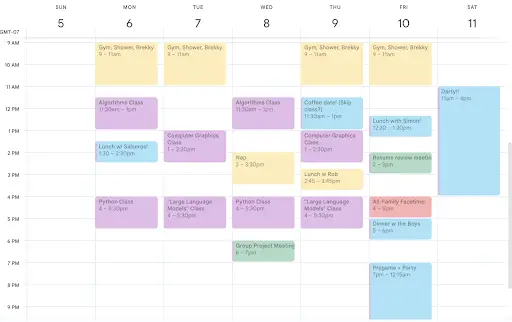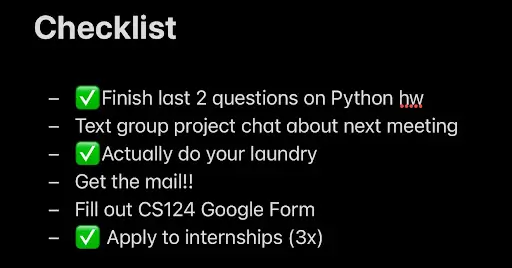
One of the biggest lessons I ever learned in school had nothing to do with math or history.
The lesson, rather, revolved around time.
Time is a nonrenewable resource, and as a high school student juggling classes, sports, clubs, friendships, college prep, and maybe even a part-time job, it can feel like you never have enough of it.
But here’s the good news: strong time management skills aren’t about cramming more into your day—they’re about making what matters most fit more smoothly into your life.
Whether you’re a freshman just getting your bearings or a senior prepping for AP exams and writing college application essays, learning how to improve time management skills can be the difference between stress and success. This guide is your friendly, no-nonsense roadmap to becoming the kind of person who doesn’t just meet deadlines, but crushes them—with time left to watch YouTube, go to prom, or sleep in once in a while.
Building Time Management Skills: 9 Steps
Step 1: Schedule Joy First
Here’s a counterintuitive piece of advice: when building your weekly schedule, start with the fun stuff.
I mentioned this tip in a previous article, but it’s so important that I think it bears repeating.
Block off time for things that give your life color and meaning—social events, time with family, naps (yes, really), sports, hobbies, and your favorite Netflix binges. This might seem indulgent, but think about it: these are the moments that recharge you. They’re not luxuries—they’re fuel.
Once those are on the calendar, schedule your classes, study time, and project deadlines around them. This technique, often called “reverse planning,” makes your schedule more sustainable and prevents burnout. It’s a way to make sure you’re living, not just grinding.
For example, here’s a picture of my calendar on a random week in 2020—my Junior year at Stanford:

Brief translation: “Brekky” is “breakfast,” and “Salseros” is the name of the Salsa dance team I was on.
Note that almost nothing is scheduled exactly back-to-back. There is always a little window of time between one event and another. This technique will become relevant in “Step 3: Always Pad Your Deadlines” and “Step 4: Meetings and Classes Almost Always Run Late.”
The only events that are back-to-back are the ones that offer a bit more leeway. For example, I won’t get in trouble if I’m a few minutes late to “Dinner w the Boys” on Friday if my “All-Family Facetime” runs late.
Likewise, I planned on potentially skipping my “Computer Graphics Class” on Thursday if my morning “Coffee Date” went particularly well.
But do note that events like “Nap,” “Darty,” and “Lunch w/ Salseros” (my college dance team) remain just as prominent as “Algorithms Class” and “Resume Review Meeting.” That way, I’m guaranteed to get my work done and have fun along the way.
Indeed, a calendar is the key ingredient to the recipe for a week that’s both fun and productive.
Step 2: Use Two Apps, Not One
When it comes to organization, Google Calendar is your command center. Use it for big-picture time blocks: class schedules, club meetings, work shifts, study sessions, and anything that has a definite time and place.
But don’t stop there.
For the little to-do items that are easy to forget—but important—like “Email the PDF to my group project teammates” or “Buy new calculator batteries,” use your phone’s Reminders app or Notes app. These mini-lists keep your brain clutter-free and ensure that the small stuff doesn’t slip through the cracks.
The two-tier system (Calendar + Notes/Reminders) mirrors how professionals juggle both their appointments and their to-dos. It’s lightweight, intuitive, and future-you will thank you.
Here’s a small checklist in my Notes app from the same week as my calendar screenshot above. These small items would be completed during some of the whitespaces on my calendar:

Step 3: Always Pad Your Deadlines
Here’s the unglamorous truth about life: stuff goes wrong. You’ll catch the flu. Your bus will be late. Your younger sibling will spill juice on your laptop the night before a paper is due (true story).
That’s why good time management skills always leave room for error. When planning how long a project will take, add an extra 20-30% to your time estimate. If you think that science project will take 4 hours, budget 5. If you believe you can get from school to debate practice in 20 minutes, assume 30.
Treat your calendar like real estate. You want some empty space between buildings—or in this case, between commitments—so you don’t get crushed when life inevitably throws a curveball.
Step 4: Meetings and Classes Almost Always Run Late
This one’s simple but crucial: if your class ends at 3:00 PM, don’t schedule another task for 3:01. In the real world, meetings and classes rarely end exactly on time. Teachers run over. Group discussions spill past the bell. Your friend needs a quick chat after student council.
So build “transition time” into your schedule. A 5–10 minute buffer between events lets you stretch, grab a snack, respond to texts, or just breathe. It makes your day more humane—and less frantic.
Step 5: Use the “One-Touch Rule”
If something takes less than 2 minutes to do—do it immediately. Responding to a text from your tutor, confirming a club meeting time, uploading that homework assignment—handle it the moment you see it.
This prevents your to-do list from piling up with micro-tasks, and it trains your brain to take quick action rather than procrastinate. It’s a simple but powerful habit that saves you hours over the long run.
Step 6: Set a Weekly Planning Date With Yourself
Time management skills aren’t just about tracking what you do—they’re about planning what you want to do before it happens.
Every Sunday (or whatever day works for you), spend 15–20 minutes planning your week. This act of building my upcoming week would be my meditative, unwinding, before-bed ritual every Sunday night.
Look at your commitments. Update your Google Calendar. Write out your Reminders list. Ask:
- What deadlines are coming up?
- Where can I fit in study time?
- Did I block off enough time to rest and recharge?
This one ritual makes you proactive instead of reactive. It turns chaos into clarity. And yes, because we’re human, we’ll occasionally have to modify our calendars on the fly as the week goes on. However, it’s easier to edit a calendar that already exists rather than write one from scratch every day.
Step 7: Protect Your Focus
Time management isn’t just about the clock—it’s about attention. You can have three hours blocked for essay-writing, but if your phone is dinging every 45 seconds, you won’t get much done.
Try these tricks:
- Use “Do Not Disturb” while studying
- Turn off push notifications
- Try the Pomodoro Technique: 25 minutes of focused work, 5-minute break, repeat.
- Use website blockers like Freedom or Cold Turkey if social media is your kryptonite
Good time management skills go hand in hand with self-discipline. Focus is your secret weapon.
(Note: We’ve gone over some tips and tricks on building focus in this article on study habits.)
Step 8: Learn to Say No—Nicely
You can’t do everything, and you shouldn’t try. Learning how to develop time management skills means learning how to prioritize.
That may mean skipping a social hangout to study for the SAT. It might mean turning down an extra club leadership position in favor of accepting a high school internship. Saying “no” doesn’t make you rude or lazy—it makes you strategic.
Think of your time as a limited budget. Spend it intentionally.
Step 9: Reflect Often, Adjust Always
Building good time management skills is a dynamic process. What worked in September might fall apart by midterms. That’s okay.
At the end of each week or month, ask yourself:
- What went well?
- Where did I lose time?
- What would I do differently next week?
Adjust your systems. Update your tools. Keep evolving. That’s how professionals—and students—stay ahead.
Final Thoughts on Building Time Management Skills
At the heart of it all, mastering your schedule is about respecting your time, your goals, and your life. When you know how to improve time management skills, you gain freedom. You reduce stress. You give yourself room to grow, experiment, succeed, and even fail without falling apart.
No one expects you to be perfect. But if you aim to be intentional, proactive, and a little flexible, you’ll find that your days get easier, your grades get better, and your confidence grows stronger.
Time management skills aren’t just for school—they’re for life. And the earlier you learn them, the more powerful you’ll be.
Now open your calendar, and start blocking off time for what matters!
Ready to take control of your time? Schedule a free consultation to learn how a HelloCollege tutor can help you build lasting time management habits.








